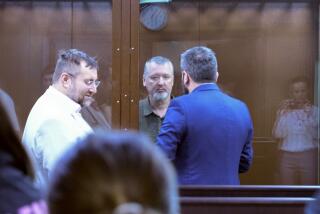Rostropovich’s Heroic Note : Cellist Took His Stand Beside Yeltsin During the Coup
- Share via
MOSCOW — A slightly stooped and balding cellist has become one of the best-sung heroes of what history may term the August revolution.
When Mstislav Rostropovich heard of the coup in Paris, he jumped on a plane to Moscow. Without telling his wife (he feared she would stop him) and without a visa, he had to sweet-talk his way past KGB guards at the airport before racing across town to join the resistance inside the Russian parliament.
Rostropovich, exiled from the Soviet Union in 1974, spent that crucial Tuesday night next to Boris N. Yeltsin, leader of the Russian Federation. He knew it could be an ill-fated last stand.
“Of course it was difficult,” said the cellist after Yeltsin’s resistance triumphed. “We waited there for the attack and we expected it to come.”
Rostropovich, 64, decided to join his embattled countrymen moments after his daughter, Elena, called him in Paris to tell him that Soviet President Mikhail S. Gorbachev had been deposed. His decision came partly from deep personal gratitude: It was Gorbachev’s process of reform that allowed him to visit the Soviet Union again last year after 16 years of exile.
He was an immediate hit with the crowd, joining demonstrators at the barricades. The sight of such a frail yet famous opponent may have led the coup leaders to consider the disastrous international reaction if they had harmed him in an assault on the parliament building.
Now director of the National Symphony in Washington, D.C., Rostropovich fell foul of the communist authorities in the early 1970s when, already an internationally famous cellist, he and his wife, the noted international soprano Galina Vishnevskaya, allowed the dissident author Alexander Solzhenitsyn to use their dacha outside Moscow.
The musician wrote an open letter to Soviet newspapers in support of his friend. The press refused to print it, but after Western journalists secured copies, Rostropovich and his wife became “non-persons.” The authorities curtailed his wife’s work at the Bolshoi Opera, refused both of them permission to travel, barred their recordings from the radio and banished them from reference books.
International colleagues took up their cause. Conductor Leonard Bernstein persuaded Sen. Edward M. Kennedy (D.-Mass.) to raise the issue with Brezhnev in 1974. Surprisingly, the Soviet leader gave the couple and their two young daughters two-year visas to “travel for artistic purposes.” In 1978, still abroad, they were stripped of their Soviet citizenship and all awards and medals. Then the United States took them in.
In his homeland, his exile has made him only more dear to his countrymen. On Aug. 22, shortly after the crowd toppled the statue of Felix Dzerzhinsksky, founder of the KGB, a cry went up under the dim lamplight of Lubyanka Square: “Rostropovich, it’s Rostropovich.”
The demonstrators knew that their famous native son had put his life on the line. A drunken youth in a denim jacket prodded the cellist in the chest, saying: “There was no storming of the parliament building, Mstislav Leopoldovich, for one reason. Because you were with us.”
More to Read
Sign up for Essential California
The most important California stories and recommendations in your inbox every morning.
You may occasionally receive promotional content from the Los Angeles Times.













